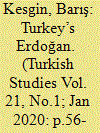|
|
|
Sort Order |
|
|
|
Items / Page
|
|
|
|
|
|
|
| Srl | Item |
| 1 |
ID:
174021


|
|
|
|
|
| Summary/Abstract |
This study examines threat perception amongst internal migrant groups in Turkey by proposing the ‘hometown cluster-based intergroup threat model.’ It contributes to the existing literature in two important respects. First, this study generates hometown clusters by measuring the social distance between migrants. Second, four dimensions of threat perception – culture, language, religion, and economics – are analyzed to reveal the development of conflict amongst internal migrant groups. The results reveal that in Gebze, a city inhabited mostly by migrants, threat perceptions are activated by both hometown clusters and ethno-religious identities.
|
|
|
|
|
|
|
|
|
|
|
|
|
|
|
|
| 2 |
ID:
174022


|
|
|
|
|
| Summary/Abstract |
With rates of asylum seekers increasing across decades worldwide, why do high- and middle-income countries persistently adopt more restrictive asylum policies? By analyzing data from the cases of Canada and Turkey (1988–92), this study shows that domestic policy preferences of decision-makers and refugee determination systems constitute the factors with the highest impact on restrictive asylum policy-making. Through the use of latent content analysis of primary historical documents and elite and expert interviews and an innovative application of the ADVIAN classification method of impact analysis, this study claims that interactions among institutions are critical for the changes a country's asylum policy. Conclusions of this study challenge existing research to move beyond monocausal explanatory schemes for understanding restrictive asylum policy trends and engage with complex frameworks accounting for interacting factors.
|
|
|
|
|
|
|
|
|
|
|
|
|
|
|
|
| 3 |
ID:
174018


|
|
|
|
|
| Summary/Abstract |
This paper seeks to uncover what drives European Parliament (EP) discussions on a privileged partnership for Turkey. In line with Habermas’s Communicative Action Theory, it scrutinizes the justifications used by the Members of the European Parliament (MEPs) in the Plenary Sessions between 2005–2012, i.e. from the start of accession negotiations until the privileged partnership’s falling into disuse in EP discussions. The research reveals that the alleged benefits of privileged partnership in contrast to the costs of Turkey’s full membership constitute the backbone of the right-wing groups’ arguments whereas the objection to a privileged partnership is justified by MEPs from left-wing groups for being against the EU’s official commitments to Turkey. In disputing Turkey’s full membership, the members of the right-wing parties reconstruct a European identity in which Turkey is the constitutive other.
|
|
|
|
|
|
|
|
|
|
|
|
|
|
|
|
| 4 |
ID:
174020


|
|
|
|
|
| Summary/Abstract |
The Turkish party law (TPL) has thus far been studied only in isolation. We do not have any knowledge of where it stands compared to other party laws. This study fills this gap by comparing the TPL with other European party laws. It codes the TPL according to the categories of party regulation that exists in the current literature and finds that the TPL is the third-most heavily regulated party law in Europe. While it is particularly keen on regulating the ‘activity and behavior’ and ‘programmatic identity’ of parties similar to Ukrainian and Spanish party laws, it is significantly behind in regulating the ‘party finance’ and ‘external oversight’ compared to other European countries. This article discusses the implications of these findings on contemporary Turkish politics, arguing that the TPL's thick definition of an ‘anti-system party’ contributes to the current democratic recession in Turkey.
|
|
|
|
|
|
|
|
|
|
|
|
|
|
|
|
| 5 |
ID:
174017


|
|
|
|
|
| Summary/Abstract |
This article aims to assess the relationship between populism and immigration in the European Union and their impact on EU–Turkey relations. Following a literature review on the current state of populist movements in the EU as well as on the findings of a comparative fieldwork conducted in Germany, France, Italy, Greece and the Netherlands, the article seeks to understand and explain how the debates on migration, refugees, mobility and Islam have an impact on the rise of extreme right-wing populism. Starting with the depiction of the main constituents of populist rhetoric in Europe vis-à-vis migrants and refugees, the article subsequently analyses social-economic, political and cultural drivers of populist extremism, and the resentment against diversity, multiculturalism, Islam, immigration and mobility among the supporters of populist parties in five selected European countries. In the last section of the article, the impact of right-wing populism and Islamophobia on the EU–Turkey relations will be analyzed.
|
|
|
|
|
|
|
|
|
|
|
|
|
|
|
|
| 6 |
ID:
174019


|
|
|
|
|
| Summary/Abstract |
Political leaders appeal to home audiences as well as ‘others’ beyond the state’s borders. Using leadership trait analysis, in the example of Turkey’s Recep Tayyip Erdoğan, this paper questions if and why a leader can exhibit different leadership traits and styles at home and away. The paper is concerned with how Erdoğan's leadership traits and style connect to Turkish foreign policy between March 2003 and May 2013. First, two profiles of Erdoğan are assessed from the interviews he gave to domestic and foreign press. The paper then reports Erdoğan’s profiles by distinguishing between different Western, Eastern, European, American, and Middle Eastern audiences. Based on these profiles, this paper argues that Erdoğan has two different profiles at home and away. Furthermore, it finds that Erdoğan’s profile from his foreign policy interviews with American news outlets stand out from his other profiles. Among other traits, Erdoğan’s task focus changes noticeably among audiences.
|
|
|
|
|
|
|
|
|
|
|
|
|
|
|
|
|
|
|
|
|